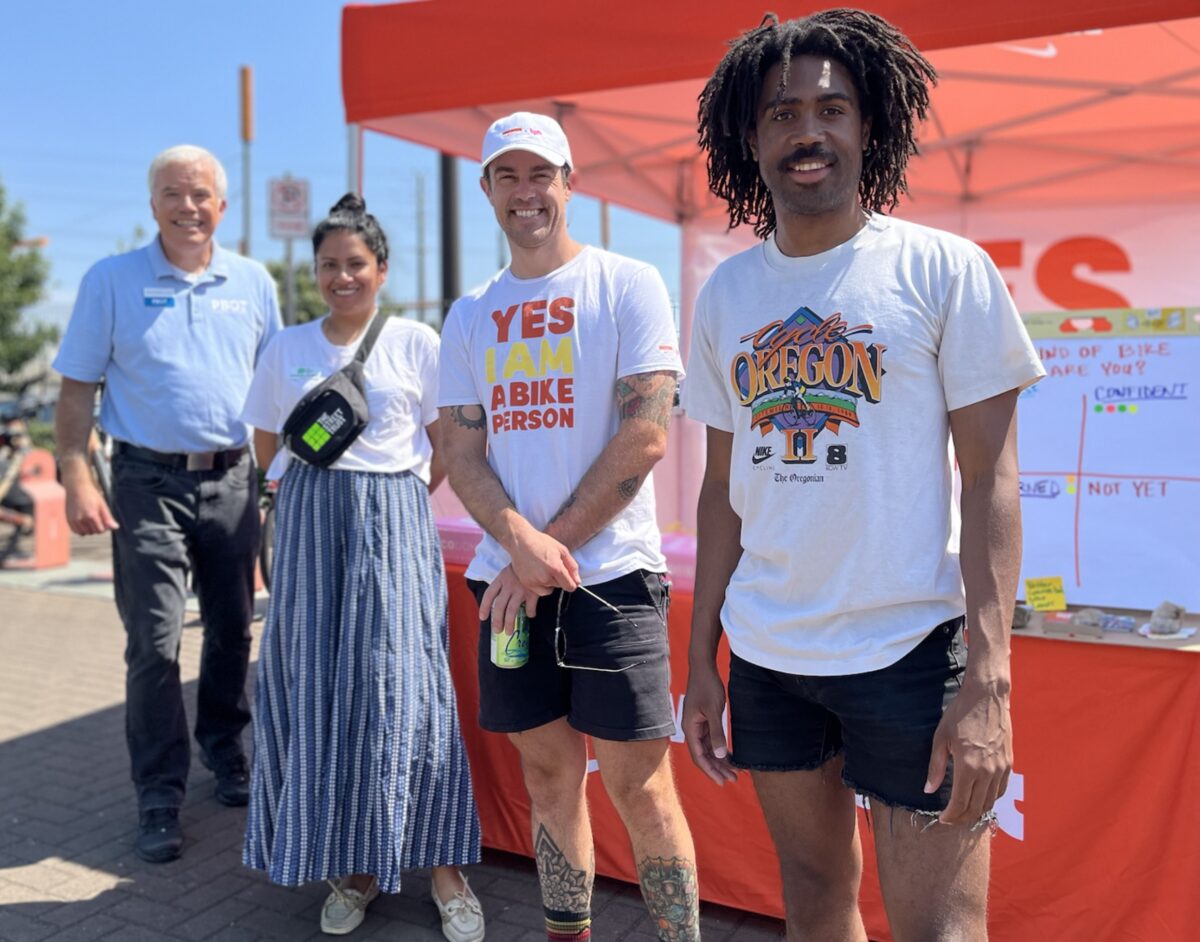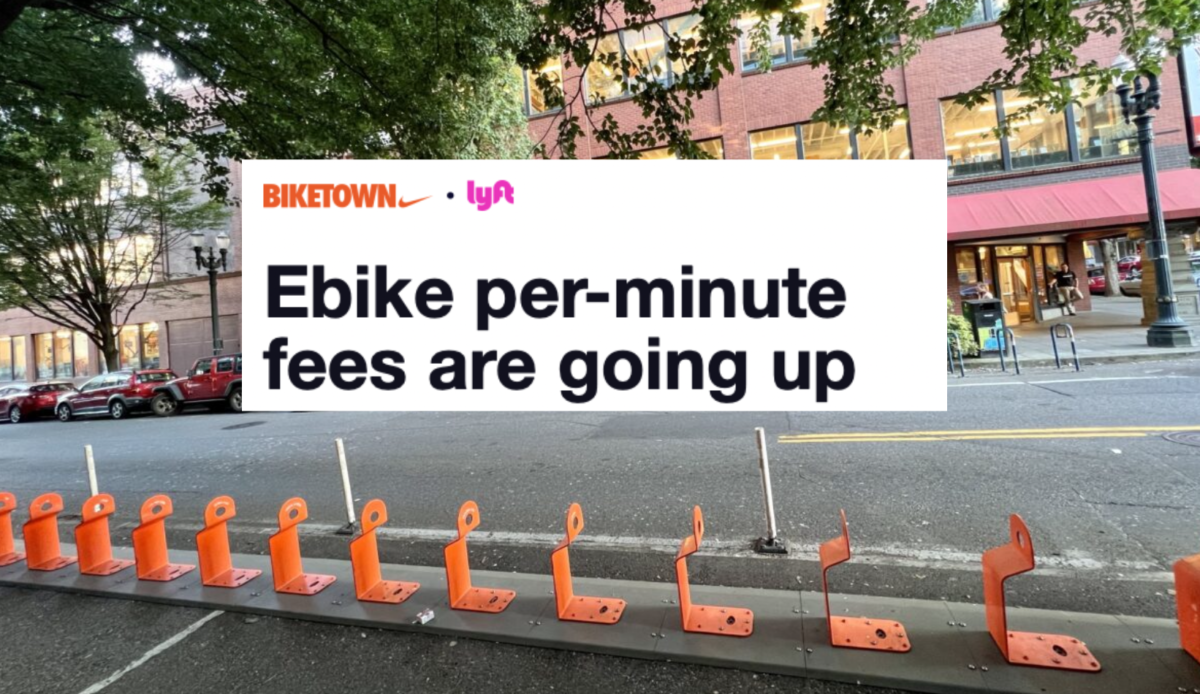“The price of Biketown is already very high, and it’s incredible that it’s being raised by 50% with no opportunity for public comment and no substantial notice.”
Iain MacKenzie
Using bike share in Portland is about to get 50% more expensive.
Last Friday afternoon, Portland’s electric bike share service Biketown announced in an email to members that the company will increase the per-minute rental rate. Starting this Friday, February 24th, Biketown members (who pay an annual $99 membership fee to get reduced rates and free unlimited unlocks) will see their ride bill increase from $0.10 a minute to $0.15. Non-members, who currently pay $0.20 a minute for Biketown rentals, will now be charged $0.30 for every 60 seconds of ride time.
“This increase stems from the growing cost of ebike operations, and will help us continue to support jobs for mechanics, battery technicians, and others who help service our ebikes throughout Portland,” a statement from Biketown reads.
No changes are currently planned for the Biketown for All program, which subsidizes rides for people living on low-incomes.
Biketown’s announcement made waves on Twitter, with people who use the program voicing their concerns about the sudden change that was made with seemingly no public input. Portland transportation advocate Tony Jordan has been one of the most outspoken people in his condemnation of the price increase. Jordan elaborated on his thoughts in a post on LinkedIn:
“I strongly believe that shared electric transportation is the future. I believe that shared public e-bike networks in cities are the pillar of that…it’s extremely distressing to see my own city fumble the ball on this. Biketown should be treated like a public utility,” Jordan wrote.
“The lack of investment in this system is shameful. The lack of support for public bike share at every level of government is a complete failure. We are going to spend hundreds of billions of dollars on electric car parking infrastructure and almost nothing on something that would be truly transformative.”
Hannah Schafer, Interim Director of Communications for the Portland Bureau of Transportation (PBOT), told BikePortland this decision comes from Lyft. (Biketown is operated and sponsored by Lyft and Nike in partnership with PBOT, and the ride share company handles day-to-day bike share operations for the city.)
“We firmly believe that bike sharing makes biking more convenient to more Portlanders, so naturally we would like to keep BIKETOWN memberships and rental rates as low as possible,” Schafer said in an email. However, she added, the rate increase is “within the company’s authority under its contract with the city.”
Portlanders aren’t the only people dealing with a recent increase in bike share fees. Lyft has raised prices even more significantly for its bike share programs in other cities across the country, like Chicago and New York.
Some advocates are calling on PBOT to invest more public money in these programs instead of relying on the whims of Lyft. People are also concerned that private companies like Lyft aren’t beholden to the public engagement process in the same way transportation agencies like TriMet (which is currently considering a fare increase of its own) are.
“The price of Biketown is already very high, and it’s incredible that it’s being raised by 50% with no opportunity for public comment and no substantial notice. That’s not the process we follow for changes to TriMet fares or the cost of on-street parking, and it shouldn’t be the process we follow for a supposedly public bikeshare system either,” transportation advocate and Biketown member Iain MacKenzie said in a message. “Lyft has been granted a monopoly to operate bikeshare in the City of Portland and in return we should expect more.”
Biketown has already received flack from some Portlanders because their fleet of bikes appears to be diminishing as the program expands into new parts of the city. It’s unclear if any earnings from the price increase will go towards purchasing and maintaining new bikes. If that were the case, would critics of the policy change their tune? Maybe, according to transportation advocacy non-profit The Street Trust (TST), which has partnered with Biketown over the last several months with the goal of increasing membership in the Biketown for All program.

In a statement to BikePortland about the price increase (which won’t apply to people who qualify for Biketown for All), TST’s André Lightsey-Walker said he and others on his team believe people would be willing to pay more for better service.
“[TST’s] top priority remains making sure people who need access [to Biketown] have it. From there, we need to ensure that the system is robust, the stations are fully stocked, and the bikes are in good condition so that Biketown remains a viable transportation option,” Lightsey-Walker said.
“We believe many riders who could afford it would happily pay the extra cents per mile if that ensures there was a Biketown available near them where and when they want to ride the system. The way to ensure Biketown’s long-term success is to ensure it’s a high-quality alternative to driving on which people can depend.”
But with bike supply still up in the air plus the price increase, some people might decide the service isn’t worth it anymore. This would be a real loss for a program with the potential to be a very valuable tool for transportation decarbonization and reform.
The data shows that once you get someone on a Biketown e-bike, it doesn’t take much to turn them into a fan. The program saw record ridership numbers in 2022, and people are (unsurprisingly) especially likely to try it out when it’s free to do so, like during Earth Day weekend last year.
Increasing fees by five or 10 cents per minute may not seem like much, but it’s a 50% price hike, and it adds up. Time will tell how the price increase effects how Portlanders use Biketown.



